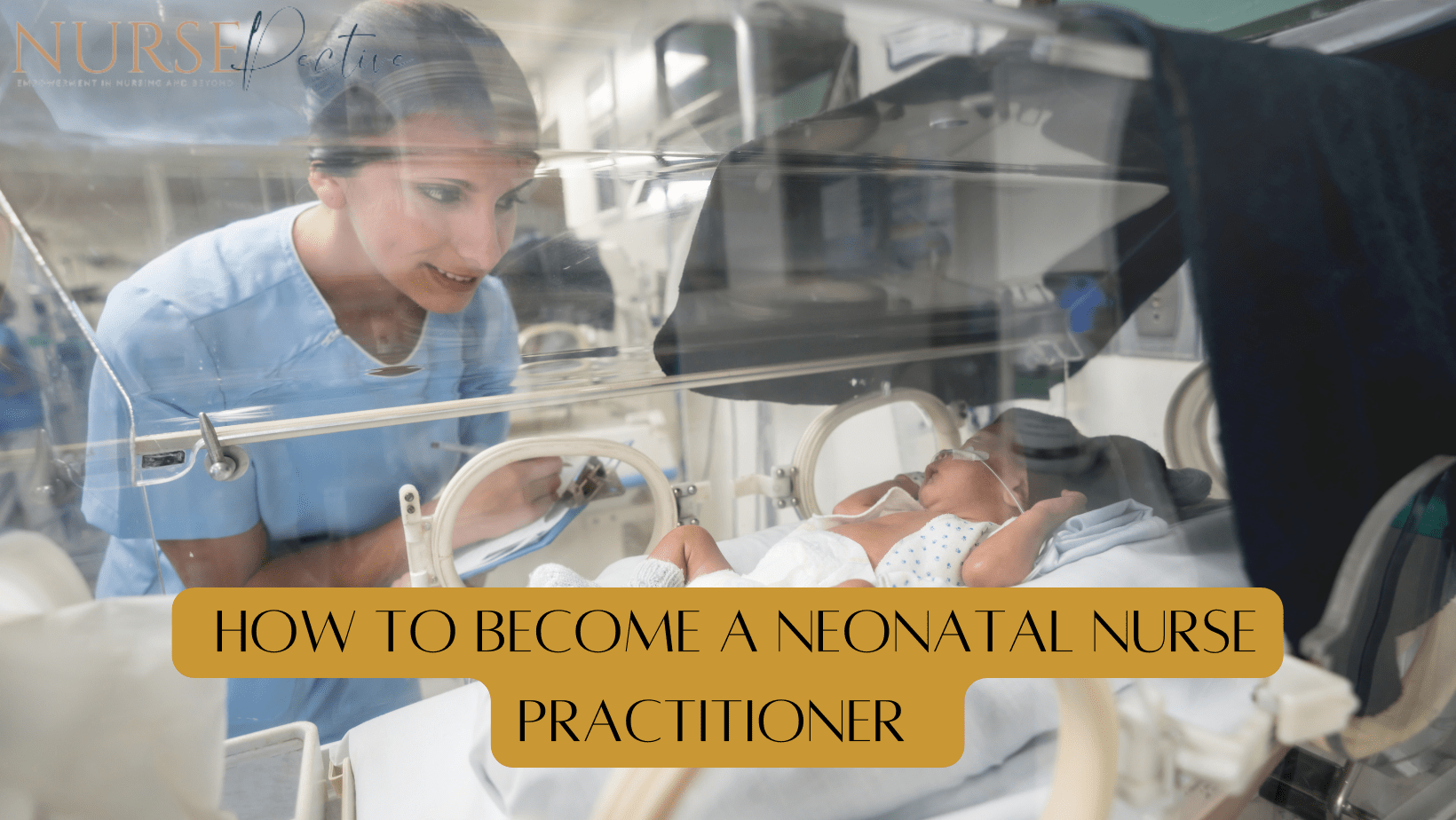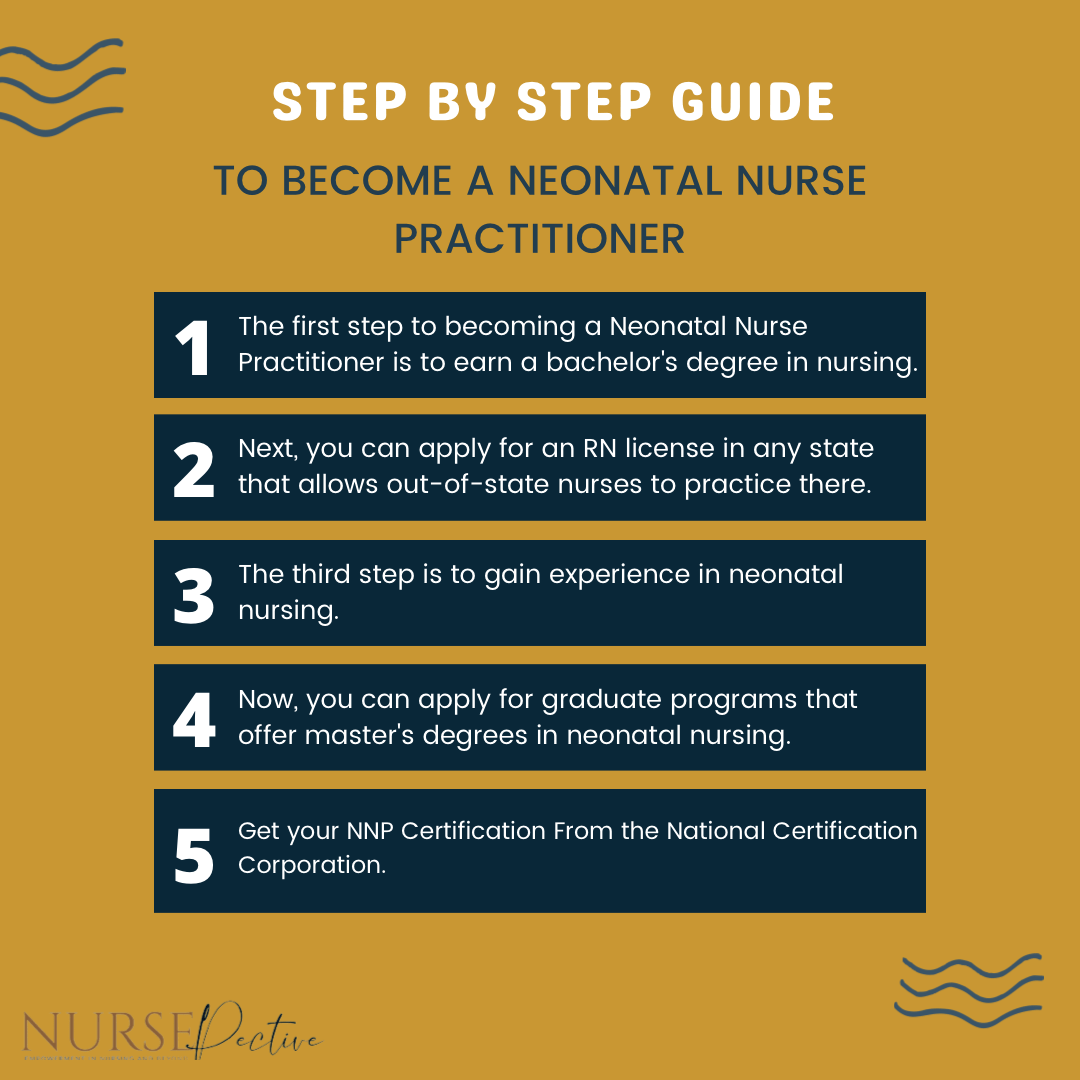
Neonatal nurse practitioners have an important job: they help to care for babies who are born premature or who have health issue that requires intensive monitoring.
They are trained to take care of these babies' physical, mental, and developmental needs. They may assist with feeding the baby and administering medications as well as helping them grow and develop normally.
In this article, we'll explore what it takes to become a neonatal nurse practitioner, as well as the education requirements and salary expectations in this field.What is a Neonatal Nurse Practitioner?

A neonatal nurse practitioner (NNP) is an advanced practice registered nurse specializing in caring for newborn babies.
They provide a wide range of services, including assessing and managing newborns, developing and implementing treatment plans, ordering tests, and making referrals to specialists.
NNPs are highly skilled professionals with advanced training in neonatal nursing and the ability to assess and manage high-risk situations.
They also provide family support, counseling, and education on infant care topics. NNPs typically work in neonatal intensive care units or delivery rooms at hospitals, but they can also work in doctor’s offices, pediatric clinics, or as independent practitioners.
In addition to providing direct patient care, NNPs may also be involved with research projects or teaching future nurses.
What do Neonatal Nurse Practitioners Do?

Neonatal nurse practitioners are specialized nurses who provide care for newborns and infants up to 28 days old.
They perform medical assessments, diagnose and treat illnesses, and provide health care services to infants and their families.
They also serve as educators, helping parents learn how to care for their newborns. Neonatal nurse practitioners may be involved in complex procedures such as resuscitation of a baby’s breathing and providing intensive support for a high-risk infant.
They work closely with neonatologists, pediatricians, and other members of a healthcare team to ensure the best possible outcome for each patient.
In addition, they develop treatment plans, provide counseling on nutrition and breastfeeding, monitor vitals, and administer medications if needed.
Neonatal nurse practitioners must have excellent communication skills when caring for an infant or speaking with family members; they often provide emotional support while caring for the needs of their patients.
Where can a Neonatal Nurse Practitioner Work?

A neonatal nurse practitioner (NNP) can work in various healthcare settings, including hospitals, birthing centers, private practice offices, and clinics.
NNPs are typically responsible for providing specialized care to newborns and their families.
With their specialized knowledge of neonatal care, NNPs play an essential role in helping ensure the health of newborns and their families.
How to Become a Neonatal Nurse Practitioner?

Step 1: Earn a BSN degree
The first step to becoming a neonatal nurse practitioner is to earn a bachelor's degree in nursing. This will prepare you for the next steps toward becoming a neonatal nurse practitioner.
Each program has its requirements, so check with the schools of interest to find out what they are.
Step 2: Get An RN License
You're a nurse, and you've got the license to prove it. Now you're ready to take on a new challenge—becoming a neonatal nurse practitioner.
Before you start working under your new title, some paperwork needs to be filed. To get started on your journey toward becoming a neonatal nurse practitioner, you'll need to get an RN license.
You can apply for an RN license in any state that allows out-of-state nurses to practice there.
You'll need to meet the same requirements as other nurses who want to work in that state, but if you do, congratulations!
You're one step closer to becoming a neonatal nurse practitioner!
Step 3: Gain Experience
The third step is to gain experience in neonatal nursing. The best way to do this is to get a job as a nurse's assistant in a neonatal unit at a hospital or clinic.
You can also get experience by working with babies who are born prematurely or who have special needs.
Step 4: Earn an MSN or DNP
Now, you can apply for graduate programs that offer master's degrees in neonatal nursing. These programs generally take two years to complete and require full-time study.
Since neonatal nurse practitioners work directly with patients and their families, it's crucial to have a solid understanding of the medical field.
The MSN degree gives you advanced knowledge in critical thinking, communication, and leadership skills. You'll also learn how to work with patients and their families while providing them with a holistic approach to care.
The DNP degree is the highest level of nursing education available. It's designed for nurses who want to provide leadership at the highest level within their profession.
A DNP prepares nurses for roles where they'll be responsible for supervising other staff members or teaching others about their area of expertise.
Step 5: Get your NNP Certification From the National Certification Corporation
The neonatal nurse practitioner (NNP) certification is a valuable credential that qualifies you to practice as a nurse practitioner in the neonatal intensive care unit (NICU).
The NNP certification is administered by the National Certification Corporation (NCC). It requires you to complete an application, pass a written exam, and meet other requirements.
Once you are certified, you can work in the NICU with your NNP license.
How Long Does It Take to Become a Neonatal Nurse Practitioner?

Becoming a neonatal nurse practitioner typically takes four to seven years of education and training.
In order to become a neonatal nurse practitioner, the first step is to obtain a Bachelor of Science degree in Nursing (BSN).
After completing a BSN program, students must then pass the National Council Licensure Examination for Registered Nurses (NCLEX-RN).
Once these two steps are completed, aspiring neonatal nurse practitioners can then pursue further graduate-level education in an accredited Masters's or Doctoral program in neonatal nurse practitioner or a related specialty.
What is the Salary Range for Neonatal Nurse Practitioners?

The salary range for neonatal nurse practitioners is between $121,771 and $143,231.
The actual salary of a neonatal nurse practitioner depends on a number of factors, including years of experience, education level, and location.
Nurses with higher levels of education tend to make more money than those who have not completed their bachelor's degrees.
What is the Scope of Practice for Neonatal Nurse Practitioners?

The scope of practice for neonatal nurse practitioners is wide-ranging. They can be independent practitioners or work in collaboration with other practitioners, such as a physician or advanced practice nurse.
Neonatal nurse practitioners may assess and diagnose neonatal conditions, initiate and manage treatment plans, create discharge plans and write progress notes.
They may also monitor infants' care and educate families on the proper care of their babies.
What is the Job Outlook for Neonatal Nurse Practitioners?

According to BLS projections, the job outlook for Neonatal nurse practitioners is strong.
The Bureau of Labor Statistics has predicted that the number of jobs for neonatal nurse practitioners will grow by 40% from 2020-2030, which is faster than the average for all occupations.
What are the Top Neonatal Nurse Practitioner Programs?

1. University of Pennsylvania
The University of Pennsylvania's Neonatal Nurse Practitioner program is one of the best in the nation.
Students get to complete clinical at some of the best healthcare facilities in the region, including the University of Pennsylvania Health System, which includes the Children's Hospital of Philadelphia, the Hospital of the University of Pennsylvania, and a number of other facilities.
2. Rush University
Rush University's NNP DNP is an online program that only comes in a part-time format.
The program only accepts applicants with a BSN or MSN degree, and it offers the program for both BSN and MSN graduates, with BSN graduates taking 3.5 years to finish the DNP.
3. Regis University
Regis University is a private school with a Christian background. It is Located In Denver, Colorado, offering a low per-credit tuition rate, making it easy to budget for the NNP program.
After graduating from the program, students can immediately enter Regis' online DNP in neonatal nursing, which is designed for nurses who already have an associate's degree or higher.
4. Baylor University
Baylor University is a private Christian school located in Waco, Texas. The university has started to embrace online education over the past decade and offers several options for students looking to gain their degree in nursing.
Baylor also offers entry options for BSN and MSN holders, with the BSN entry option taking just over three years to complete.
5. Northeastern University
Northeastern's Neonatal Program comes in a one-year full-time option and a two-year part-time option, both of which cover topics including early assessment, clinical roles, and pharmacology specifics.
The program is designed to prepare students for various clinical settings, such as hospitals, clinics, and long-term care facilities.
It also helps its students and graduates secure some of the best positions available in their fields
6. University of Texas Arlington
The University of Texas Arlington (UTA) is a top-rated public research school and one of the largest schools in the University of Texas System.
The Neonatal Nurse Practitioner program at UTA is a two-year, 42-semester hour program that prepares students to become RNs with advanced training in neonatal care.
7. Duke University
Duke University boasts one of the best neonatal NP degrees. Students benefit from one-on-one experiential learning, and the curriculum is designed to help them develop a deep understanding of neonatal care and practice.
Nurses complete 43 credit hours and 616 clinical hours over the two-year program so they can apply what they've learned immediately upon graduation.
What is the difference between an NNP and an RN?

NP's are trained, licensed, and independent healthcare clinicians who concentrate on managing patients’ health conditions by treating injuries and illnesses, as well as supporting injury and disease prevention.
NPs work in a wide variety of settings. They can be found in hospitals, primary care practices, urgent care centers, clinics, and nursing homes.
Whereas registered nurses (RNs) are medical professionals who provide hands-on care in different medical and community settings.
They perform a range of duties, work directly with patients, doctors, and other healthcare professionals, and have advanced education and training beyond high school.
Conclusion
There you have it!
Neonatal nursing is a rewarding career that can lead to even more rewarding careers in research, education, and administration.
If you're interested in making the world a better place through neonatal care, we hope this article has been helpful in showing you what's possible.
FAQ’s
Should I enroll in a neonatal nurse practitioner program?
Enrolling in a neonatal nurse practitioner program is an amazing opportunity for those who are interested in pursuing a career in nursing.
The program offers nurses the chance to specialize and gain more experience in the field of neonatal care.
It provides them with the theoretical knowledge and practical skills required to provide quality care to infants, as well as the ability to diagnose, treat and manage illnesses and conditions.
In addition, they gain an understanding of family dynamics, birthing practices, pediatric assessment methods, and how to work collaboratively with other healthcare professionals.
Enrolling in a neonatal nurse practitioner program is definitely worth considering if you have a passion for working with infants and their families.
How hard is it to become a neonatal nurse practitioner?
Becoming a neonatal nurse practitioner is not an easy journey. It requires hard work and dedication to complete the necessary education and training requirements.
Are neonatal nurse practitioners in demand?
Neonatal nurse practitioners (NNPs) are in high demand due to the increasing number of premature births and the need for specialized care for newborns.






